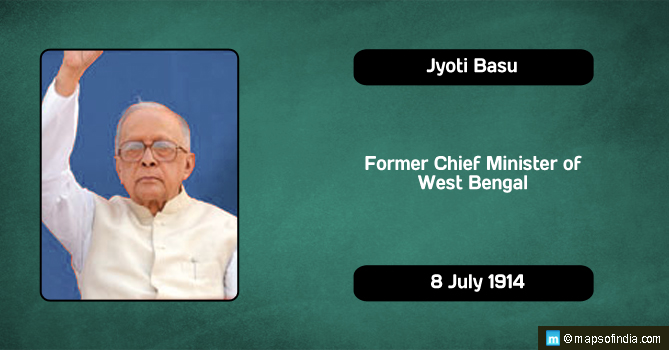Jyoti Basu Biography
This article was updated on 11 July, 2019.
*****
Jyoti Basu Biography
Beginning of the Life of the Legend: The Jyoti Basu
Serving as the Chief Minister of West Bengal in India for longest period of time between 1977 and 2000, Jyoti Basu soon became a guide, a friend, a philosopher and a much respected political figure for many of his old and contemporary colleagues and even for the opposition leaders,
who liked to pay him visits for guidance. He was born on July 8, 1914 in the city of Kolkata (erstwhile Calcutta). He took English Honors in Presidency College to complete his graduation.
After graduation, Basu went to London to study Law. This phase of his life proved very crucial for him, as it was the destination where he first got the taste of politics and Marxism.
Political Career of the Legend: The Jyoti Basu
He flew back from London to India in the year 1940 after finishing Law. Then, he soon became a member of Communist Party of India (CPI). In the year 1944, he joined the Bengal railway workers’ union.
After two years i.e. in 1946, he defeated Humayun Kabir, who was a member of the Congress party, in the Bengal legislative assembly elections. Thereafter, his saga of success spanning over the years 1952, 1957, 1962, 1967, 1969 and 1971 saw him winning seat from Baranagar assembly constituency. However, after a long period of success, Basu had to face defeat in the snap polls that were held in the year 1972.
Jyoti Basu had formed the Communist Party of India-Marxist (CPI-M) in the year 1964 and after three years i.e. in 1967 he was chosen as the deputy chief minister under the reign of coalition government in Bengal. However, it was on June 21, 1977, Basu finally became the West Bengal Chief Minister. He led the Left Front government till the month of November 6 of 2000.
In 1996, he became one of the strongest contenders for the post of Prime Minister of India. However, he had to miss this opportunity because of his party’s veto. Disappointed by the party decision, Basu referred to this incident as a “historic blunder”.
Growing age and ill health made Basu retire from active politics. He resigned from the post of chief minister of West Bengal in the year 2000. Later in the year 2004, he again emerged on the scene of Indian politics and helped forming a coalition between the Congress-led United Progressive Alliance (UPA) and Left parties. In the 18th session of the CPI(M) politburo organized in Delhi in the year 2005, he was re-elected to the power.
End of the Life Journey of the Legend – The Jyoti Basu
The man who played key role in forming the political and economic future of the state of West Bengal breathed his last on 17th January 2010 at 11.47am. He was admitted to a city hospital for experiencing serious respiratory distress. The hospital reports revealed he was suffering from pneumonia and at a later stage he was detected with brain clotting.
The legendary Indian politician donated his eye to help the needy and his body to science for research work. The government owned SSKM Hospital will be conducting a research work on the brain of the late Marxist leader.
As a gesture of tribute, one day holiday was announced in the state and all the influential politicians including Prime Minister Manmohan Singh, well known film personality Amitabh Bacchan and religious leaders among other dignitaries sent their condolences for him.

